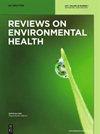Cadmium exposure and thyroid hormone disruption: a systematic review and meta-analysis
IF 3
4区 医学
Q2 ENVIRONMENTAL SCIENCES
引用次数: 0
Abstract
Abstract Introduction This meta-analysis aimed to analyze the effect of cadmium (Cd) exposure on thyroid hormone disruption. Content Databases including PubMed, Embase, Cochrane Library, and Scopus were searched for studies published up to December 14, 2022. Studies evaluating the association between Cd exposure (blood Cd [BCd] or urine Cd [UCd]) and thyroid function (thyroid-stimulating hormone [TSH], free thyroxine [FT4], total triiodothyronine [TT3]) or thyroid autoimmunity (thyroglobulin antibody [TgAb] or thyroperoxidase Ab [TPOAb]) were included. Summary and Outlook This systematic review included 12 cross-sectional studies. Cd exposure showed a neutral association with TSH (pooled correlation=0.016, 95 % confidence interval [CI]=−0.013 to 0.045, p=0.277), FT4 (pooled correlation=0.028, 95 % CI=−0.005 to 0.061, p=0.098), and thyroid autoimmunity (pooled odds ratio=1.143, 95 % CI=0.820–1.591, p=0.430). However, Cd exposure showed a positive association with TT3 (pooled correlation=0.065, 95 % CI=0.050–0.080, p<0.001), which was consistent with the BCd and UCd subgroup analyses (pooled correlation=0.053 and 0.081, respectively, both p<0.001). Cd exposure was not associated with TSH, FT4, or thyroid autoimmunity but tended to increase with TT3.镉暴露与甲状腺激素紊乱:系统回顾与荟萃分析
摘要 引言 本荟萃分析旨在分析镉(Cd)暴露对甲状腺激素紊乱的影响。内容 在PubMed、Embase、Cochrane Library和Scopus等数据库中检索了截至2022年12月14日发表的研究。纳入了评估镉暴露(血镉[BCd]或尿镉[UCd])与甲状腺功能(促甲状腺激素[TSH]、游离甲状腺素[FT4]、总三碘甲状腺原氨酸[TT3])或甲状腺自身免疫(甲状腺球蛋白抗体[TgAb]或甲状腺过氧化物酶抗体[TPOAb])之间关系的研究。总结与展望 本系统综述纳入了 12 项横断面研究。镉暴露与促甲状腺激素(总相关性=0.016,95% 置信区间[CI]=-0.013 至 0.045,p=0.277)、FT4(总相关性=0.028,95% 置信区间=-0.005 至 0.061,p=0.098)和甲状腺自身免疫(总几率比=1.143,95% 置信区间=0.820 至 1.591,p=0.430)呈中性相关。然而,镉暴露与TT3呈正相关(集合相关性=0.065,95% CI=0.050-0.080,p<0.001),这与BCd和UCd亚组分析一致(集合相关性分别为0.053和0.081,均p<0.001)。镉暴露与促甲状腺激素、FT4或甲状腺自身免疫无关,但往往与TT3有关。
本文章由计算机程序翻译,如有差异,请以英文原文为准。
求助全文
约1分钟内获得全文
求助全文
来源期刊

Reviews on Environmental Health
Social Sciences-Health (social science)
CiteScore
7.20
自引率
2.60%
发文量
75
期刊介绍:
Reviews on Environmental Health (REVEH) is an international peer-reviewed journal that aims to fill the need for publication of review articles on hot topics in the field of environmental health. Reviews on Environmental Health aims to be an inspiring forum for scientists, environmentalists, physicians, engineers, and students who are concerned with aspects of human health, including quality of life, that are determined by physiological and psychosociological interactions between man and physical, chemical, biological, and social factors in the environment.
Reviews on Environmental Health is an important niche served by no other journal, that’s being a site where thoughtful reviews can be published on a variety of subjects related to both health and environment. One challenge is to bridge the research on environmental causes of disease with the clinical practice of medicine. Reviews on Environmental Health is a source of integrated information on environment and health subjects that will be of value to the broad scientific community, whether students, junior and senior professionals, or clinicians.
 求助内容:
求助内容: 应助结果提醒方式:
应助结果提醒方式:


